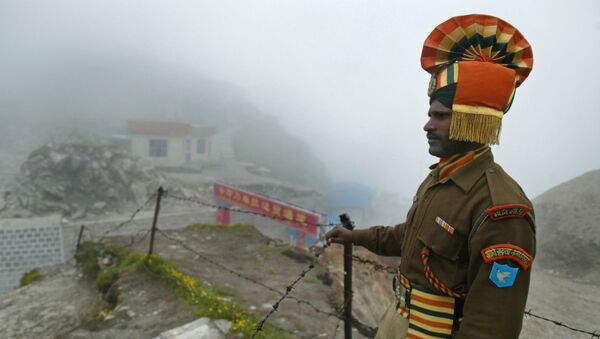New Delhi (Sputnik) — Indian Army Chief General Bipin Rawat, while speaking at the annual press conference in New Delhi, said that India was dealing with the "pressures exerted by China" and trying to not escalate the situation.
"Yes, China is exerting pressure. We are dealing with it. Yes, we should try that it is not escalated. We will not allow our territory to be intruded. Troops are earmarked, should a situation arise our troops are ready to cater," Chief of Army Staff General Bipin Rawat was quoted by news agency ANI as saying.
Yes, China is exerting pressure. We are dealing with it. Yes we should try that it is not escalated. We will not allow our territory to intruded. Troops are earmarked, should a situation arise our troops are ready to cater: Chief of Army Staff General Bipin Rawat in Delhi pic.twitter.com/Heuw6N7QVK
— ANI (@ANI) January 12, 2018
"The PLA has occupied the northern Doklam area. A large number of troops have gone back from that area. Tents, toilets and observation posts remain, but manpower has thinned down. Once winter gets over, we can expect movement again. We have to be prepared for that," Army Chief General Rawat said.
Chinese troops continue to be deployed in North Doklam but numbers reduced. Tents and posts remain so they could start something after the snow melts. We have to be prepared — Army Chief
— Manu Pubby (@manupubby) January 12, 2018
General Rawat said the time had come for India to shift focus from Pakistan to its northern border, asserting that China may be powerful, but India is not weak either.
China is powerful, but India is not weak either, says Army chief Bipin Rawat #BipinRawathttps://t.co/qafGPd7YCR
— The Indian Express (@IndianExpress) January 12, 2018
Indian and Chinese troops were involved in a bitter standoff which lasted for 73 days last summer at Doklam — a trijunction of India, China and Bhutan, after Indian troops stopped the Chinese Peoples' Liberation Army from constructing a road in the area that is claimed by both China and Bhutan as their own. The issue was resolved diplomatically in November. The Indian Army chief claimed that the tension could have turned into a limited war had not India opted for peace.


